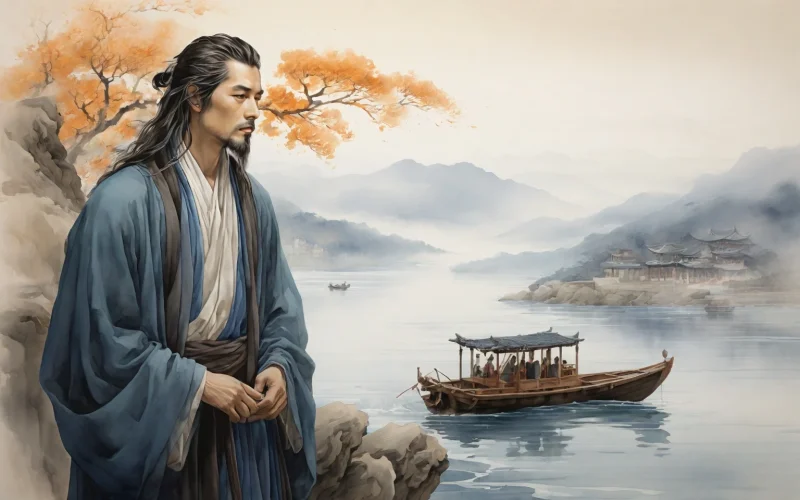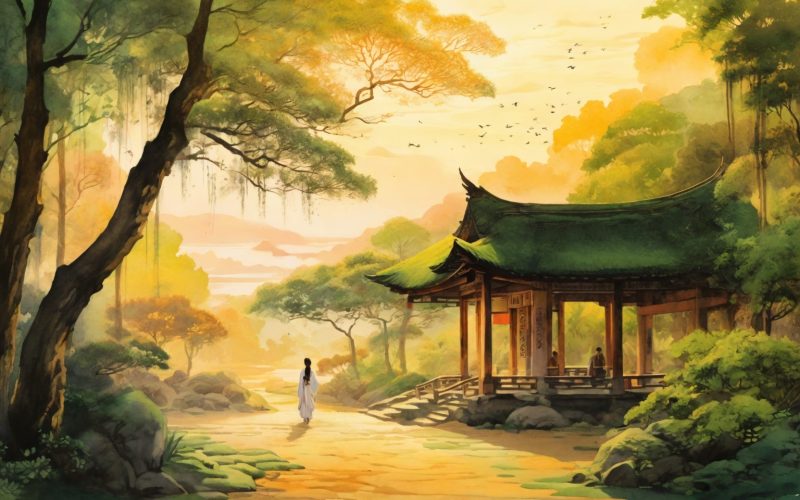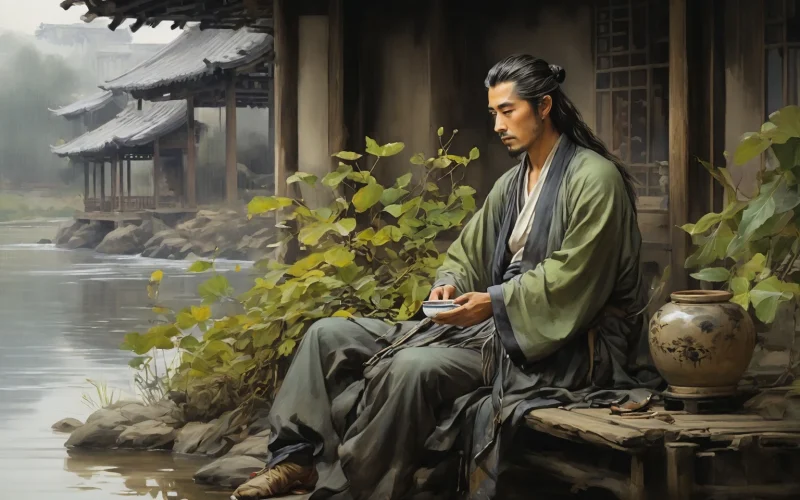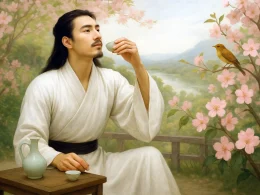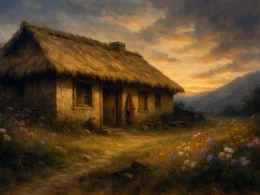Gone is the ferry boat.
Who'll carry me afloat?
At dusk uphill bell rings;
Over seaside rain sings.
Grief saddens the waves cold;
My face and hair look old.
Southeast flies a lone bird;
Your voices can't be heard.
Original Poem:
「淮上即事寄广陵亲故」
韦应物
前舟已眇眇,欲渡谁相待?
秋山起暮钟,楚雨连沧海。
风波离思满,宿昔容鬓改。
独鸟下东南,广陵何处在?
Interpretation:
This poem was written in the autumn of the fourth year of Dali (769 AD) when the poet was returning north to Luoyang via Chuzhou after leaving Yangzhou. It expresses the poet's longing for friends and family left behind in Guangling (Yangzhou), particularly his elder brother and close friend Lu Yu. The poem subtly conveys deep emotions, blending them with the melancholy beauty of the depicted scenes.
First Couplet:“前舟已眇眇,欲渡谁相待?”
(The small boat ahead has faded into the distance. I linger here, hesitant—who awaits me at the ferry crossing?)
This opening depicts the image of a lone boat drifting away, mirroring the poet's reluctance to continue his journey. In just a few words, the poet captures a profound sense of solitude and reluctance to part.
Second Couplet:“秋山起暮钟,楚雨连沧海。”
(The evening bell echoes from the autumn mountains; the Chu region's drizzle veils the vast sea.)
This couplet paints a desolate natural scene. The imagery of the evening bell and autumn rain combines to evoke a mournful atmosphere. The poet uses the melancholic environment to intensify his feelings of homesickness and the weight of his travels.
Third Couplet:“风波离思满,宿昔容鬓改。”
(Filled with thoughts of separation amidst the turbulent waves, I realize that the past has changed my face and grayed my hair.)
This couplet directly addresses the poet’s feelings of longing, though not overtly. By mentioning the “wind and waves” and his altered appearance, the poet subtly conveys his inner sorrow and the passage of time.
Fourth Couplet:“独鸟下东南,广陵何处在?”
(A solitary bird flies toward the southeast; where exactly is Guangling?)
The closing lines use the metaphor of a lone bird flying homeward to symbolize the poet’s yearning for his friends and family in Guangling. The rhetorical question “Where exactly is Guangling?” encapsulates both his longing and his sense of helplessness, bringing the poem to an emotional climax.
Features of the Writing
- Emotion through imagery and subtlety: The poet masterfully intertwines his emotions with the landscape, avoiding direct declarations of feelings yet suffusing the scenes with deep sentiment.
- Fusion of emotion and scenery: The imagery of bells, rain, and lone birds creates a hauntingly beautiful setting, which amplifies the poet’s sorrow and longing.
- Reserved yet profound emotion: The restrained expression of feelings makes the poem’s emotions more poignant. The use of implied meaning and vivid metaphors enhances its artistic appeal.
Overall Appreciation
This poem focuses on vivid imagery, with emotions subtly infused into the scenes. From the lone boat and autumn mountains to the drizzling rain and solitary bird, the poet externalizes his inner turmoil through the natural world. The rhetorical question in the final couplet heightens the sense of loss and longing, leaving readers with a lingering sense of sorrow and resonance.
Insights
This poem demonstrates how to effectively use natural imagery to convey deep emotions and evoke a sense of melancholy. By seamlessly blending emotions with vivid imagery, the poet achieves a refined and profound artistic effect. The lone boat, autumn mountains, and other symbols create a vivid yet mournful ambiance, encapsulating the universal experience of separation. The poem reminds us to cherish the connections we have, even as it immortalizes the pain of parting in a timeless and evocative way.
Poem translator:
Xu Yuan-chong (许渊冲)
About the poet:
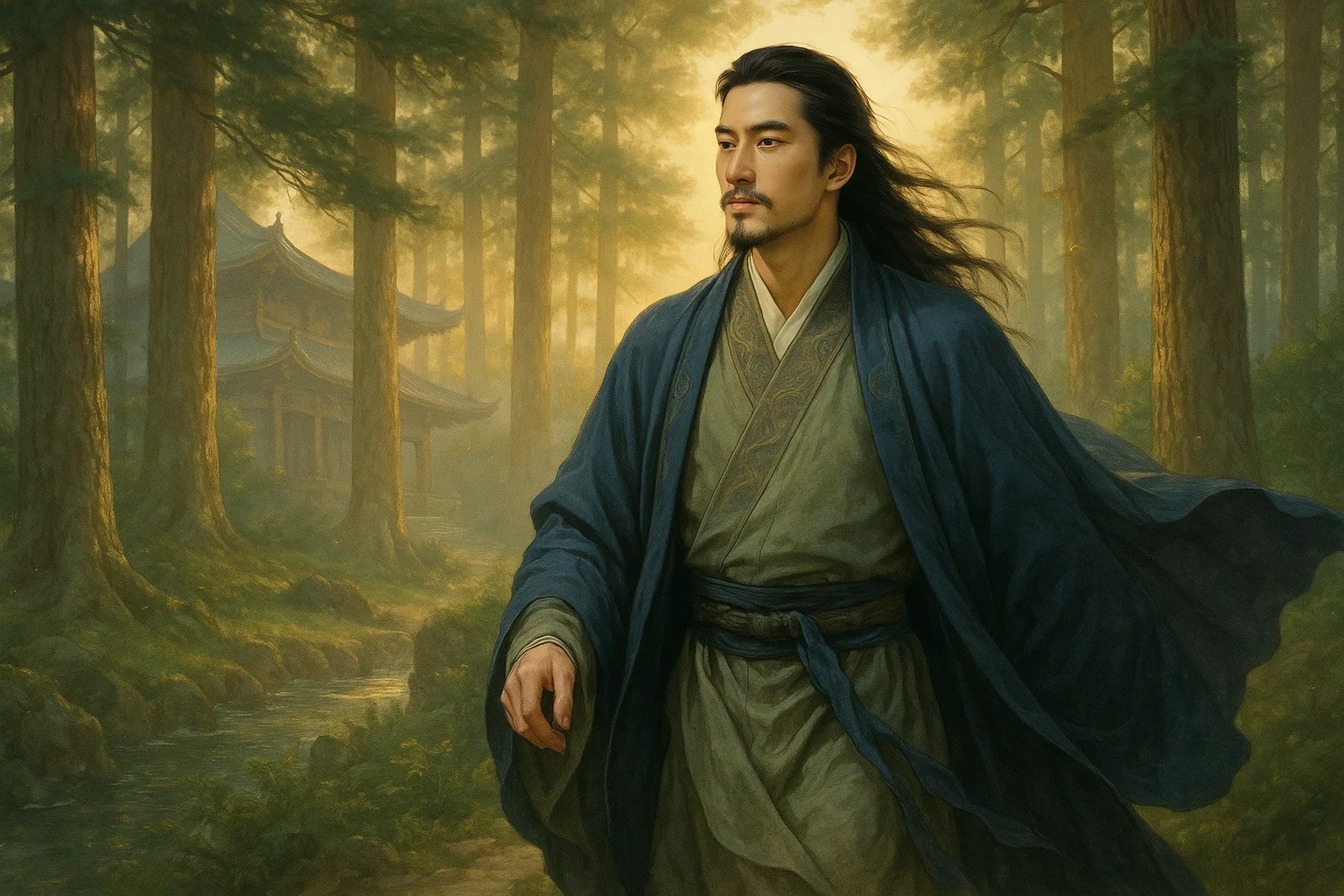
Wei Yingwu (韦应物), circa 737 - 786, was a native of Chang'an, Beijing. His poems were collected in the Wei Suzhou Collection, which included poems concerned with the plight of the people, expressions of disobedience to the times and indignation against the world, and descriptions of idyllic landscapes, etc., of which the ones describing idyllic landscapes are the most famous, and have been sung by posterity in particular.






